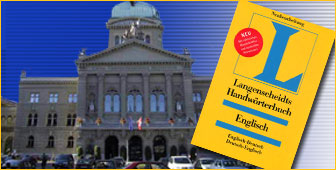English powers ahead

Switzerland may have four national languages already, but English is making a strong bid to become the fifth.
Right across the country, schools and businesses are pouring resources into learning the language.
One of the first signs that English was on the rise was the move by canton Zurich’s education department to introduce it as the first foreign language taught in primary schools, in place of the traditional French.
The decision was at first criticised, in particular by teachers in the French-speaking part of Switzerland, who felt abandoning a national language in this way was divisive.
But schools in several other Swiss cantons have now followed Zurich’s example.
Bilingual schools take off
Meanwhile many Swiss parents are so impatient for their children to learn English that they are enrolling them in the growing number of private bilingual schools in Switzerland.
Lernstudio Junior near Zurich currently offers 70 pupils, aged between five and 12, the chance of an education conducted equally in German and English.
Despite fees of around SFr20,000 ($13,500) a year, the school has a waiting list.
Headmaster Iwo Mueller is currently looking around for new premises in order to expand pupil numbers to 120.
“Parents want this system for their children,” Mueller told swissinfo. “They believe that if the children start as early as possible, they have a much better chance of becoming really bilingual.
“And they know that the two hours a week of English offered by the state system is just not enough.”
Swiss stubbornness
Ironically, it may be the presence of Switzerland’s four national languages (German, French, Italian and Romansh) which is hastening the growth of English.
Just as in countries like India or Singapore, where there are several local languages, the residents of Switzerland need one common language in which to communicate with one another.
A traditional stubbornness has made many German-speaking Swiss reluctant to speak French to their neighbours in western Switzerland, for example.
While Swiss in the French-speaking regions speak at best High German, and not the much more common Swiss-German dialect.
As a result some of the larger Swiss companies, for example banking giant UBS and telecoms operator Swisscom, now use English as the official language in many of their departments.
And it is has become government policy to translate most official documents into English as well as the Swiss languages.
Questionable policy
“This is a disappointment to me,” said Professor Richard Watts, of Bern University’s Institute of English studies.
“Don’t get me wrong,” he told swissinfo, “I’m not against English in Switzerland, but I think it is overrated.”
“As a linguist, I am interested in the languages of Switzerland, and I think giving in to this demand for English is demoting French and Italian.”
Nevertheless, the rise of English in Switzerland has led to increased work for Watts and his colleagues at the Institute.
The Swiss National Science Foundation has commissioned the Institute to research the rise of what’s been called “pan Swiss-English” – a new form of English that develops when non-native English speakers communicate with one another.
“It is the case that a sort of ‘euro English’ is developing in Switzerland,” said Watts.
“It uses knowledge and structures of French and German; for example, we hear the word ‘agenda’ instead of diary, and in grammar there is an overuse of the infinitive.”
Blow me in the shoes
Pan Swiss-English was evident in all its glory when the Post Office Bank picked English as the language for a new campaign promoting its bank account for young people.
Extensive market research revealed that young people in Switzerland named English as their language of choice, and London as the city they most wanted to visit.
“So we asked young people to translate common German expressions literally into English,” explained Rudolf Saxer, director of marketing for the Post Office Bank.
The result was a series of amusing posters on billboards across Switzerland, with phrases like “you can blow me in the shoes”, or “I give you the cold shoulder”.
As an incentive to open a youth account, the Post Office offered young people what they said they wanted: vouchers towards a trip to London, and English lessons.
“We’ve had an amazing response to this campaign,” Saxer told swissinfo. “Thousands of new accounts have been opened.”
Unity anxieties
Richard Watts, however, sees little to smile about in campaigns like that of the Post Office.
He is from Britain originally and, perhaps naturally, has great admiration for the linguistic diversity of his adopted country.
“I’m not happy about all the money that’s being invested in English,” he explained.
“The money should go into making sure Romansh doesn’t die, or into supporting French.
“I can’t see the logic in giving more power to English when Switzerland already has four national languages. If you live in a multicultural society you should be proud of it and endeavour to keep it.
“I really think we need to sit down and think what this emphasis on English means for the other Swiss languages, for Swiss unity and for keeping the country together.”
English a must
But such concerns are not shared by Iwo Mueller and Rudolf Saxer, both of whom see no problem with English becoming Switzerland’s fifth national language.
“If English can help people to communicate, then that’s fine,” said Mueller. “I’ll accept any language.
“And we simply have to recognise that English is the language to talk,” he continued. “I see that just in teaching our pupils: they really want to learn. Getting them motivated to learn French is a completely different matter.”
Meanwhile for Saxer, the English issue is also an economic one.
“English is the language of business, and of tourism,” he explained. “These are important things for Switzerland.”
“So while I think it is important that we support the Swiss national languages,” he continued, “for me English is a must.”
swissinfo, Imogen Foulkes
Ten per cent of people in Switzerland do not count one of the four Swiss national languages as their mother tongue.
65 per cent of the Swiss population have German as their first language.
Zurich was the first canton to introduce English as the first foreign language.

In compliance with the JTI standards
More: SWI swissinfo.ch certified by the Journalism Trust Initiative



You can find an overview of ongoing debates with our journalists here. Please join us!
If you want to start a conversation about a topic raised in this article or want to report factual errors, email us at english@swissinfo.ch.